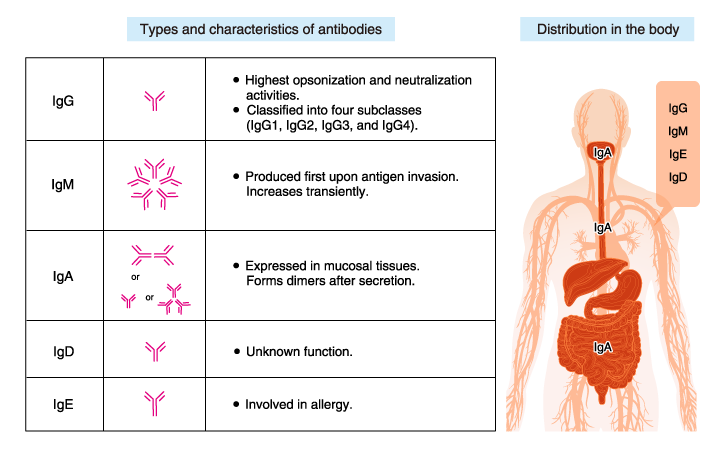Which of the Following Is Not a Function of Antibodies
Which of the following is not a function of antibodies Asked by wiki 07102021 in Biology viewed by 91 People Which is not a function of antibodies. Kidneys Spleen Tonsils Liver.
23 3 Antibodies Concepts Of Biology 1st Canadian Edition
Examples of antibody functions include neutralization of.

. Transcytosis mucosal immunity n eonatal immunity. They neutralize pathogens by masking their surface. All of the following are functions of antibodiesexcept a.
A targeting foreign cells so that complement proteins can cause cellular lysis B binding and inactivating chemical toxins released by bacteria or other microorganisms C linking soluble. The specificity of antibodies. Proteins are complex large molecules required for various functions.
The immune system creates antibodies which lock themselves with the antigens to destroy them from the body. All antibody units are made up of two identical heavy chains and two identical light chains. Agglutinate or precipitate antigen.
For example an antibody that recognizes the mumps virus cannot recognize the measles virus. Following this experiment a similar procedure produced a humanized anti-lysozyme antibody D13 proving that CDR grafting can be used for antibodies that recognize protein antigens. 26 Which of the following is NOT a function of antibodies.
Which of the following is NOT a function of antibodies. Answered by wiki 07102021. They activate complement fixation.
Activate complement enhance phagocytosis. Antibody functions include all of the following except _____. Direct killing of pathogens.
Antibodies act by a number of mechanisms most of which engage other arms of the immune system. In the case of the B-cell receptor the C-terminus is a hydrophobic membrane-anchoring sequence and in the case of antibody it is a hydrophilic sequence that allows. Antibodies activate the complement system to destroy bacterial cells by lysis.
A Neutralizing bacterial toxins B Preventing viruses from entering tissue cells C Direct cell killing through the release of toxic chemicals D Opsonizing foreign antigen. 9-1 Which of the following is not a function of antibodies. Opsonizing foreign antigen B 20.
In the setting of infectious diseases antibody function refers to the biological effect that antibody has on a pathogen or its toxin. Antibodies are proteins with high specificity towards antigens. Neutralizing bacterial toxins B.
Conversely an antibody that recognizes the measles virus cannot recognize the mumps virus. The proteins function as enzymes to regulate the reaction rate transport proteins to carry molecules inside or outside the cells and as antibodies to fight against foreign particlesThe storage and transmission of genetic information are not done by proteins but by DNA. What cells decline in number during the final phase of HIV-1 infection when an individual is said to have AIDS.
Thus assays that measure antibody function are differentiated from those that strictly measure the ability of an antibody to bind to its cognate antigen. 54 Which of the following is not a method by which antibodies work. A neutralizing antigen B direct cell lysis C enhancing phagocytosis D agglutinating and precipitating antigen.
Antibody provides long-term protection against pathogens because it persists for years after the presence of the antigen. Mucosa-associated lymphatic tissues MALT include the. Antibodies do NOT directly kill pathogens.
They exert toxic effects directly. Neutralization of infectivity Phagocytosis Antibody-dependent cellular cytotoxicity ADCC Complement-mediated lysis of pathogens or of infected cells. Which of the following is NOT a function of antibodies.
Antibodies are the secreted form of the B-cell receptor. Antibodies can simply block interactions of molecules or they can activate the classical complement pathway known as complement dependent cytotoxicity or CDC by interaction of C1q on the C1 complex with clustered. They act as opsonins that mediate phagocytosis.
They act as molecular adaptors that bridge together pathogen and phagocyte surfaces. Another function is unique to. Preventing viruses from entering tissue cells C.
The CDRs from the heavy-chain variable region of the mouse antibody were substituted for the corresponding CDRs of a human anti-myeloma antibody. All of these choices are functions of antibodies. Major functions of the antibodies are.
Antibodies are secreted and function away from the cell. They neutralise toxins by binding with them they help in opsonisation ease in phagocytosis by natural killer cells and macr. An antibody is identical to the B-cell receptor of the cell that secretes it except for a small portion of the C-terminus of the heavy-chain constant region.
Each antibody recognizes one specific antigen. Coating pathogens to prevent attachment to tissues Activation of complement Bind to toxins secreted by pathogens Directly destroy invading pathogens 27 Which class of antibody is found in breast milk. They are not bound to the cell membrane.
Direct cell killing through the release of toxic chemicals D. This feature is called antibody specificity. The antigens can be in the form of bacteria viruses or other harmful disease-causing organisms.
Antibodies do not help in viral entry to the host cell. View the full answer. Following are some of the key functions of antibody.
Which type of antibody can be created in a laboratory for the treatment of diseases such as. Which of the following is not a function of antibodies. Activates the immune system in case of bacterial pathogens.
Directly attacks viral pathogens. Which of the following is not a function of antibodies Agglutination Opsonization Phagocytosis Neutralization. The Y shaped antibody unit has an antigen binding site at the end of each arm of the Y so all antibodies have at least two antigen binding sites.
The four characteristics of adaptive immunity include all of the followingexcept a. Based on the structural and immunological properties there are five types of antibodies- IgM IgA IgE IgG and IgD.

The Division Of Labor The Requirements Imposed On The Antibody Molecule By The Two Functions Are In A Sense Quite Opposite Th Division Molecules Molecular

How Does The Body Defend Itself Against Microbes Innate Immune System Adaptive Immune System Immune System Good Health Tips

No comments for "Which of the Following Is Not a Function of Antibodies"
Post a Comment